译林版英语八上课文
牛津译林版英语八上Unit 5《Wild animals》(Reading1)说课稿
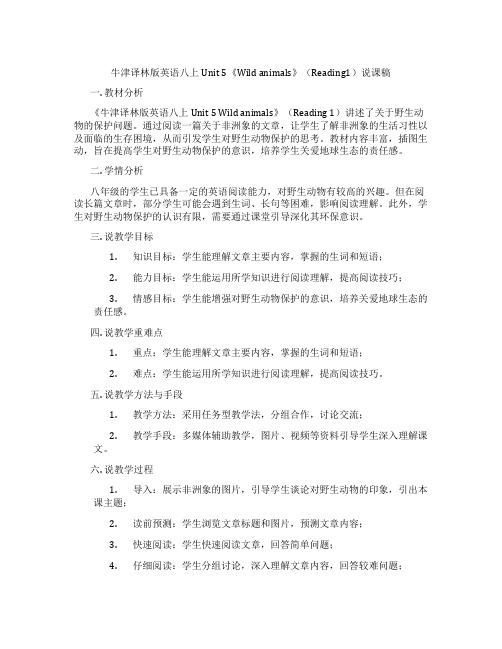
牛津译林版英语八上Unit 5《Wild animals》(Reading1)说课稿一. 教材分析《牛津译林版英语八上Unit 5 Wild animals》(Reading 1)讲述了关于野生动物的保护问题。
通过阅读一篇关于非洲象的文章,让学生了解非洲象的生活习性以及面临的生存困境,从而引发学生对野生动物保护的思考。
教材内容丰富,插图生动,旨在提高学生对野生动物保护的意识,培养学生关爱地球生态的责任感。
二. 学情分析八年级的学生已具备一定的英语阅读能力,对野生动物有较高的兴趣。
但在阅读长篇文章时,部分学生可能会遇到生词、长句等困难,影响阅读理解。
此外,学生对野生动物保护的认识有限,需要通过课堂引导深化其环保意识。
三. 说教学目标1.知识目标:学生能理解文章主要内容,掌握的生词和短语;2.能力目标:学生能运用所学知识进行阅读理解,提高阅读技巧;3.情感目标:学生能增强对野生动物保护的意识,培养关爱地球生态的责任感。
四. 说教学重难点1.重点:学生能理解文章主要内容,掌握的生词和短语;2.难点:学生能运用所学知识进行阅读理解,提高阅读技巧。
五. 说教学方法与手段1.教学方法:采用任务型教学法,分组合作,讨论交流;2.教学手段:多媒体辅助教学,图片、视频等资料引导学生深入理解课文。
六. 说教学过程1.导入:展示非洲象的图片,引导学生谈论对野生动物的印象,引出本课主题;2.读前预测:学生浏览文章标题和图片,预测文章内容;3.快速阅读:学生快速阅读文章,回答简单问题;4.仔细阅读:学生分组讨论,深入理解文章内容,回答较难问题;5.小组活动:学生分组进行角色扮演,模拟文章中的场景,加深对文章的理解;6.总结提升:教师引导学生总结文章主题,谈论野生动物保护的重要性;7.作业布置:学生课后写一篇关于我国野生动物保护的文章。
七. 说板书设计板书设计如下:1.课题:Unit 5 Wild animals2.阅读文章:African Elephants3.生词短语:–wildlife protection–survival–conservation–poaching–habitat destruction4.文章主题:关爱野生动物,保护地球生态八. 说教学评价1.课堂参与度:观察学生在课堂上的发言和讨论情况;2.阅读理解:检查学生回答问题的准确性;3.作业完成情况:评估学生课后作业的质量。
+Unit1+Friends+Grammar+课件+2024-2025学年牛津译林版八年级英语上册

Comparative Superlative
+ er
+ est
→ longer → longest
→ smaller → smallest
+r
+ st
→ finer
→ finest
→ nicer
→ nicest
- y + ier
- y + iest
→ easier → prettier
→ easiest → prettiest
My book is more interesting than his. His book is less interesting than mine.
Language Goal
➢ 1.能熟悉并正确运用本课时的重点单词和 短语。
➢ 2.能掌握形容词的比较级和最高级的构成 和基本用法。
Comparative and superlative adjectives
The bike is _fa_s_t___.
The tractor is _f_a_st_e_r_ .
The car is _th_e__fa_s_t_es_t .
Compare them
(Comparative and superlative adjectives)
形容词通常有三种形式: 原级,比较 级和最高级,用来表示人或事物在某 方面的不同程度。如:
最高级 + st
nicest finest 把 y 改成 i + est prettiest easiest
P12, A
thin — thinner, thinnest
clean— cleaner, cleanest sad— sadder, saddest
牛津译林版英语八上Unit 5《Wild animals》(Reading1)教学设计
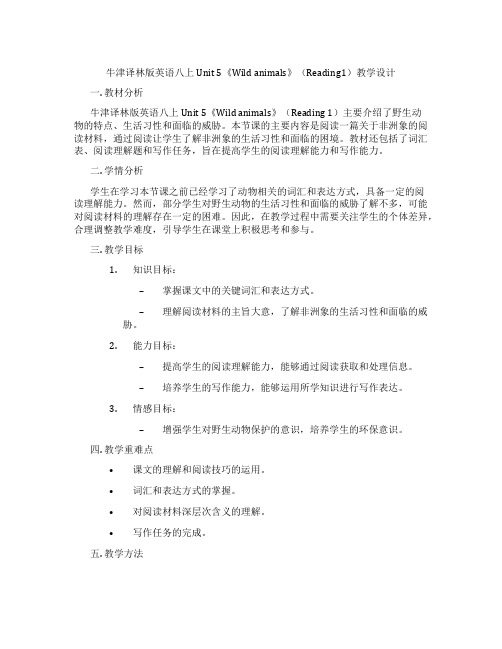
牛津译林版英语八上Unit 5《Wild animals》(Reading1)教学设计一. 教材分析牛津译林版英语八上Unit 5《Wild animals》(Reading 1)主要介绍了野生动物的特点、生活习性和面临的威胁。
本节课的主要内容是阅读一篇关于非洲象的阅读材料,通过阅读让学生了解非洲象的生活习性和面临的困境。
教材还包括了词汇表、阅读理解题和写作任务,旨在提高学生的阅读理解能力和写作能力。
二. 学情分析学生在学习本节课之前已经学习了动物相关的词汇和表达方式,具备一定的阅读理解能力。
然而,部分学生对野生动物的生活习性和面临的威胁了解不多,可能对阅读材料的理解存在一定的困难。
因此,在教学过程中需要关注学生的个体差异,合理调整教学难度,引导学生在课堂上积极思考和参与。
三. 教学目标1.知识目标:–掌握课文中的关键词汇和表达方式。
–理解阅读材料的主旨大意,了解非洲象的生活习性和面临的威胁。
2.能力目标:–提高学生的阅读理解能力,能够通过阅读获取和处理信息。
–培养学生的写作能力,能够运用所学知识进行写作表达。
3.情感目标:–增强学生对野生动物保护的意识,培养学生的环保意识。
四. 教学重难点•课文的理解和阅读技巧的运用。
•词汇和表达方式的掌握。
•对阅读材料深层次含义的理解。
•写作任务的完成。
五. 教学方法1.任务型教学法:通过设定具有挑战性的任务,激发学生的学习兴趣,培养学生独立思考和合作交流的能力。
2.情境教学法:创设真实、生动的情境,使学生在实际情境中学习和运用英语。
3.交际法:通过师生互动、生生互动,提高学生的口头表达能力。
4.启发式教学法:引导学生主动探索,发现问题,培养学生的自主学习能力。
六. 教学准备1.教师准备:–熟悉教材,明确教学目标和要求。
–准备相关的教学资源和素材。
2.学生准备:–预习课文,提前了解课文内容。
–准备笔记本,记录课堂笔记。
七. 教学过程1.导入(5分钟)–教师通过提问方式引导学生回顾已学的动物相关知识,激发学生的学习兴趣。
译林版八年级上册英语Unit1文章对话英汉对照

译林版八年级上册英语Unit1文章对话英汉对照Book 8 Unit 1 P6Hobo: I’m hungry, Eddie.Eddie: I have a cake. Do you want some ?Hobo: Yes, please. I’m thirsty too. Can I have something to drink ?Eddie: What about some milk ?Hobo: Ok. Thanks. You are so kind. Can I have some more food?Eddie: Sorry, Hobo. There’s nothing in the fridge.Hobo: What about the pizza in your bowl ? Maybe we can share it.霍波:我饿了,埃迪。
埃迪:我有一个蛋糕。
你想要一些吗?霍波:是的,请。
我也渴了。
我能喝点什么吗?埃迪:来点牛奶怎么样?霍波:好的。
谢谢。
你真是太好了。
我能再吃点东西吗?埃迪:对不起,霍波。
冰箱里什么都没有。
霍波:你碗里的披萨怎么样?也许我们可以分享。
Book 8 Unit 1 P7Daniel: What makes good friends, Amy?Amy: Well, good friends should be honest. You can trust them because they never tell lies. Daniel: Yes, that’s very important. I think good friends should be interesting too. They can also tell you funny jokes.Amy: Yes, that’s true. I also think good friends should be helpful.Daniel: I agree.丹尼尔:什么是好朋友,艾米?艾米:好朋友应该诚实。
牛津译林版英语八上Unit6《Birdwatchers》(integratedskills)说课稿

牛津译林版英语八上Unit 6《Birdwatchers》(integrated skills)说课稿一. 教材分析牛津译林版英语八上Unit 6《Birdwatchers》主要介绍了关于观鸟的知识。
本节课的主要内容包括词汇、语法、阅读理解和听说技能的训练。
通过学习本节课,学生能够掌握与观鸟相关的词汇和表达方式,了解一般现在时的用法,提高阅读理解和听说能力。
二. 学情分析根据对学生的了解,他们在学习过程中具备一定的词汇和语法基础,对于一般现在时已有初步的认识。
然而,在阅读理解和听说技能方面,部分学生还存在一定的困难。
因此,在教学过程中,需要关注学生的个体差异,针对不同层次的学生进行有针对性的教学。
三. 说教学目标1.知识目标:学生能够掌握与观鸟相关的词汇和表达方式,了解一般现在时的用法。
2.能力目标:学生能够提高阅读理解和听说能力,运用所学知识进行实际交流。
3.情感目标:培养学生对观鸟活动的兴趣,增强对自然环境的保护意识。
四. 说教学重难点1.重点:观鸟相关词汇和表达方式的掌握,一般现在时的用法。
2.难点:阅读理解和听说技能的提高,运用所学知识进行实际交流。
五. 说教学方法与手段1.教学方法:采用任务型教学法,让学生在完成任务的过程中掌握知识,提高能力。
2.教学手段:利用多媒体课件、图片、视频等资源,激发学生的学习兴趣,提高课堂效果。
六. 说教学过程1.导入:通过展示观鸟的图片,引导学生谈论观鸟的兴趣,自然导入本节课的主题。
2.呈现:教师展示观鸟的词汇和表达方式,引导学生学习并掌握。
3.practice:学生进行小组活动,运用一般现在时进行交流,巩固所学知识。
4.阅读理解:学生阅读文章,回答相关问题,提高阅读理解能力。
5.听说训练:学生观看视频,完成听力任务,提高听说能力。
6.总结:教师对本节课的内容进行总结,强调重点知识点。
7.作业布置:学生课后观鸟活动,增强对自然环境的保护意识。
七. 说板书设计板书设计如下:1.观鸟词汇:列出本节课所学的观鸟相关词汇。
+Unit1课文原文与翻译(素材)+022-2023学年牛津译林版八年级英语上册
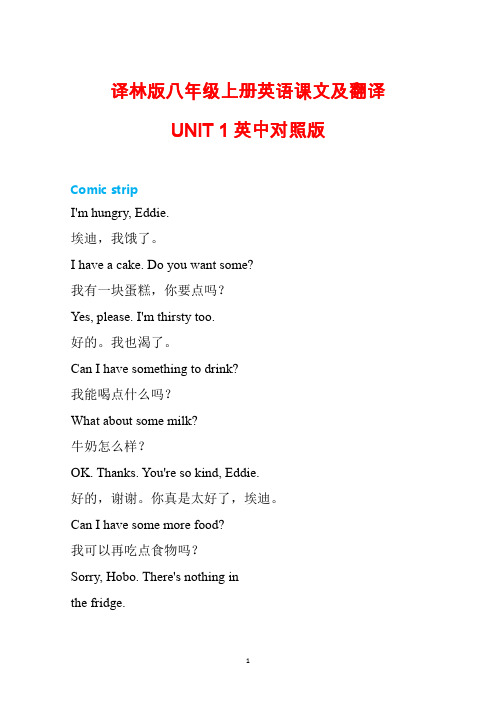
译林版八年级上册英语课文及翻译UNIT 1英中对照版Comic stripI'm hungry, Eddie.埃迪,我饿了。
I have a cake. Do you want some?我有一块蛋糕,你要点吗?Yes, please. I'm thirsty too.好的。
我也渴了。
Can I have something to drink?我能喝点什么吗?What about some milk?牛奶怎么样?OK. Thanks. You're so kind, Eddie.好的,谢谢。
你真是太好了,埃迪。
Can I have some more food?我可以再吃点食物吗?Sorry, Hobo. There's nothing inthe fridge.对不起,荷布。
冰箱里什么也没有了。
What about the pizza in your bowl? Maybe we can share it.你碗里的比萨怎么样?或许我们可以分着吃。
ReadingBetty is one of my best friends.贝蒂是我最好的朋友之一。
She is slim and has short hair.她很瘦并且留着短头发。
Betty is generous.贝蒂很大方。
She is willing to share things withher friends.她乐意与她的朋友分享东西。
She is also helpful and ready tohelp people any time.她还乐于助人并且在任何时候都愿意帮助他人。
She helps me with my homeworkand she always gives her seat onthe bus to someone in need.她帮助我完成家庭作业,她总是在公交车上让位给有需要的人。
牛津译林版英语八上Unit 5《Wild animals》(integrated skills)教学
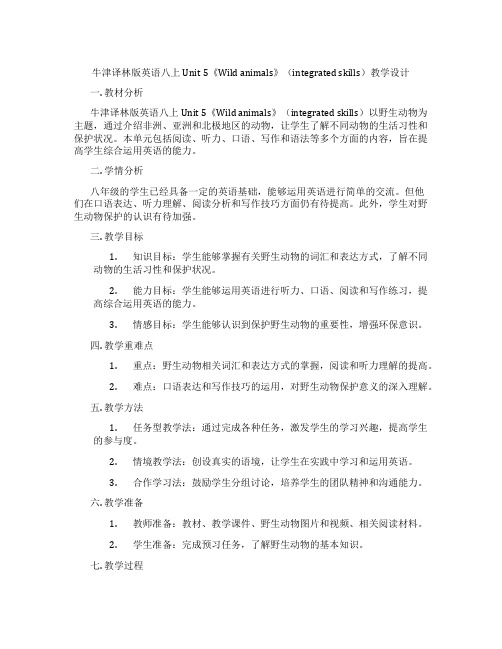
牛津译林版英语八上Unit 5《Wild animals》(integrated skills)教学设计一. 教材分析牛津译林版英语八上Unit 5《Wild animals》(integrated skills)以野生动物为主题,通过介绍非洲、亚洲和北极地区的动物,让学生了解不同动物的生活习性和保护状况。
本单元包括阅读、听力、口语、写作和语法等多个方面的内容,旨在提高学生综合运用英语的能力。
二. 学情分析八年级的学生已经具备一定的英语基础,能够运用英语进行简单的交流。
但他们在口语表达、听力理解、阅读分析和写作技巧方面仍有待提高。
此外,学生对野生动物保护的认识有待加强。
三. 教学目标1.知识目标:学生能够掌握有关野生动物的词汇和表达方式,了解不同动物的生活习性和保护状况。
2.能力目标:学生能够运用英语进行听力、口语、阅读和写作练习,提高综合运用英语的能力。
3.情感目标:学生能够认识到保护野生动物的重要性,增强环保意识。
四. 教学重难点1.重点:野生动物相关词汇和表达方式的掌握,阅读和听力理解的提高。
2.难点:口语表达和写作技巧的运用,对野生动物保护意义的深入理解。
五. 教学方法1.任务型教学法:通过完成各种任务,激发学生的学习兴趣,提高学生的参与度。
2.情境教学法:创设真实的语境,让学生在实践中学习和运用英语。
3.合作学习法:鼓励学生分组讨论,培养学生的团队精神和沟通能力。
六. 教学准备1.教师准备:教材、教学课件、野生动物图片和视频、相关阅读材料。
2.学生准备:完成预习任务,了解野生动物的基本知识。
七. 教学过程1.导入(5分钟)利用图片和视频展示不同野生动物,引导学生谈论自己喜欢的动物,激发学生的学习兴趣。
2.呈现(10分钟)教师展示课文标题《Wild animals》,引导学生预测文章内容。
然后逐段呈现课文,让学生注意生词和短语。
3.操练(15分钟)学生分组进行角色扮演,模拟课文中的对话,巩固所学词汇和表达方式。
译林版八年级上册英语
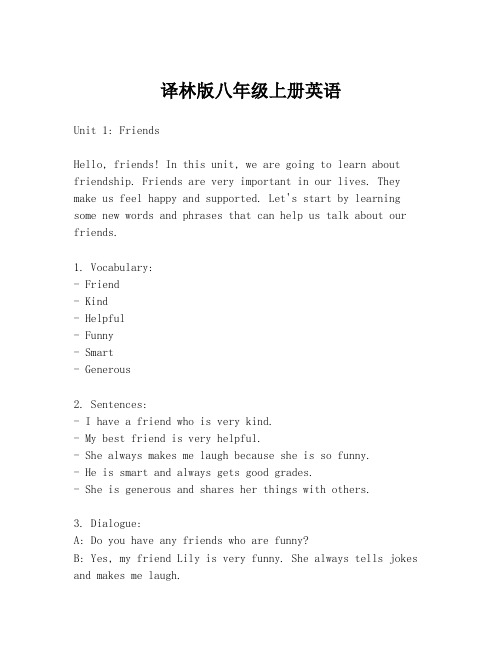
译林版八年级上册英语Unit 1: FriendsHello, friends! In this unit, we are going to learn about friendship. Friends are very important in our lives. They make us feel happy and supported. Let's start by learning some new words and phrases that can help us talk about our friends.1. Vocabulary:- Friend- Kind- Helpful- Funny- Smart- Generous2. Sentences:- I have a friend who is very kind.- My best friend is very helpful.- She always makes me laugh because she is so funny.- He is smart and always gets good grades.- She is generous and shares her things with others.3. Dialogue:A: Do you have any friends who are funny?B: Yes, my friend Lily is very funny. She always tells jokes and makes me laugh.Unit 2: School LifeNow, let's talk about school life. School is a place where we learn and make friends. It is also a place where we have fun and grow.1. Vocabulary:- Classroom- Teacher- Student- Lesson- Homework- Exam2. Sentences:- I like my classroom because it is clean and bright.- My teacher is very kind and patient.- I have many students in my class.- We have a new lesson every day.- I have a lot of homework to do every night.- I am a bit nervous about the upcoming exam.3. Dialogue:A: How do you feel about school life?B: I enjoy school life. I learn a lot and make many friends.Unit 3: FamilyFamily is an important part of our life. They are the people who love and care for us. Let's learn some words and phrasesto talk about our families.1. Vocabulary:- Family- Parent- Brother- Sister- Grandparent- Cousin2. Sentences:- My family is very important to me.- My parents are my best teachers.- I have a younger brother and an older sister.- My grandparents live with us.- I have many cousins, and we often play together.3. Dialogue:A: Can you tell me about your family?B: Sure, I have a big family. We all live together and have a lot of fun.Unit 4: HobbiesHobbies are activities that we enjoy doing in our free time. They can help us relax and make us happy. Let's learn some words and phrases to talk about our hobbies.1. Vocabulary:- Hobby- Reading- Drawing- Playing sports- Dancing- Singing2. Sentences:- My hobby is reading books.- I like to draw pictures in my free time.- Playing sports keeps me healthy and strong.- I enjoy dancing to music.- Singing is a great way to express myself.3. Dialogue:A: What is your favorite hobby?B: My favorite hobby is playing the guitar. It's fun and I love the sound it makes.Unit 5: Food and DrinkFood and drink are essential for our health and well-being. They give us energy and make us feel good. Let's learn some words and phrases to talk about food and drink.1. Vocabulary:- Food- Drink- Healthy- Tasty- Fresh- Nutritious2. Sentences:- I like to eat healthy food.- I drink water every day to stay hydrated.- The food at this restaurant is very tasty.- I prefer fresh fruits and vegetables.- This soup is nutritious and delicious.3. Dialogue:A: What kind of food do you like?B: I like food that is both healthy and tasty. It makes me feel good.Unit 6: TravelTraveling is a great way to explore new places and experience different cultures. It can be exciting and educational. Let's learn some words and phrases to talk about traveling.1. Vocabulary:- Travel- Destination- Sightseeing- Backpack- Adventure- Souvenir2. Sentences:- I love to travel and see new places.- My dream destination is Paris.- Sightseeing is my favorite part of traveling.- I always pack a backpack when I travel.- I enjoy adventures and trying new things.- I like to buy souvenirs to remember my trips.3. Dialogue:A: Have you ever been on a trip?B: Yes, I have. I went to the beach last summer and had a great time.Unit 7: FestivalsFestivals are special occasions that celebrate culture, traditions, and community. They are a time for fun, food, and festivities. Let's learn some words and phrases to talk about festivals.1. Vocabulary:- Festival- Celebration- Parade- Fireworks- Costume- Tradition2. Sentences:- I enjoy attending festivals with my family.-。
- 1、下载文档前请自行甄别文档内容的完整性,平台不提供额外的编辑、内容补充、找答案等附加服务。
- 2、"仅部分预览"的文档,不可在线预览部分如存在完整性等问题,可反馈申请退款(可完整预览的文档不适用该条件!)。
- 3、如文档侵犯您的权益,请联系客服反馈,我们会尽快为您处理(人工客服工作时间:9:00-18:30)。
译林版英语八上课文
Unit 1 Meet My Family
Hi, everyone! My name is Lily and I"m in Grade 8. Today, I"d like to introduce you to my family.
My father"s name is John. He"s a doctor. He works at a hospital in our city. He"s very kind and patient with his patients. My mother"s name is Sarah. She"s a teacher. She teaches English at a high school. She"s also very kind and patient, just like my father. I have an older brother named David. He"s currently studying at university. He"s majoring in computer science.
We all live together in a big house on the outskirts of the city. We have a beautiful garden where we grow vegetables and fruits. My parents love cooking and they often use the vegetables and fruits we grow in our meals. We also have two pets - a dog named Max and a cat named Luna. They are both very cute and playful.
In our free time, we enjoy doing things as a family. We often go hiking or camping in the mountains. We also love watching movies and playing board games together. My family is very important to me, and I"m grateful for all the love and support they give me.
That"s all about my family. Thanks for listening!。
